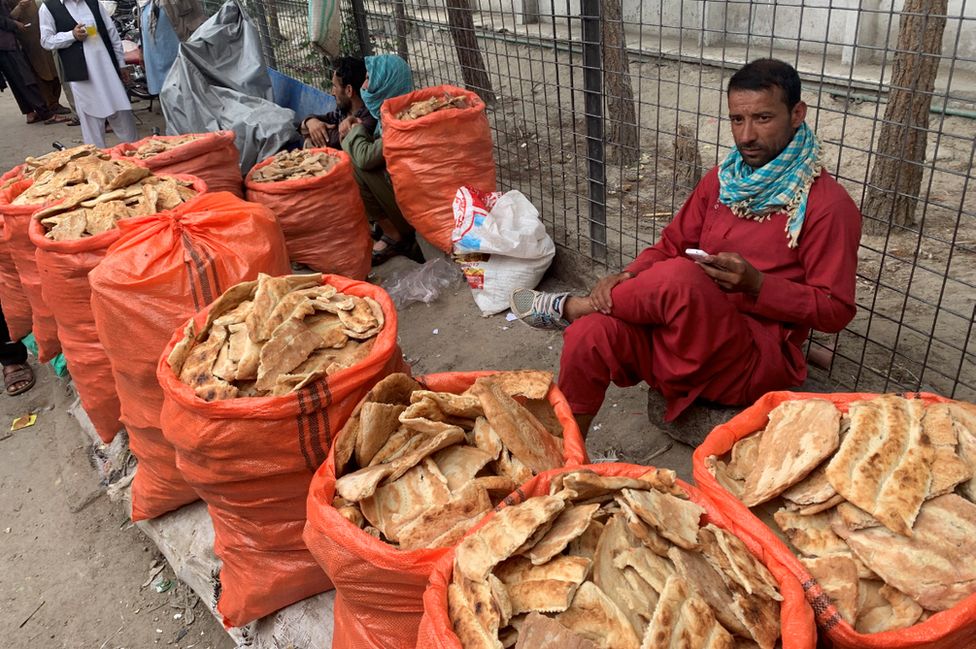Scraps of stale bread are keeping Afghans alive
- Published

On a market stall in front of a blue-domed mosque in Kabul, large orange sacks are filled with stale, leftover naan bread.
It's usually fed to animals, but now, according to those selling it, more Afghans than ever are eating it themselves.
Shafi Mohammed has been selling stale bread for the past 30 years at Kabul's Pul-e-Kheshti market.
"Before, five people used to buy this bread in a day, now it's more than 20 people," he says.
The market is bustling - and everyone there we speak to complains of the economic crisis that has enveloped the country. Average incomes have been slashed by a third since the Taliban takeover last August, whilst food prices have risen sharply.
Rifling through the sacks, Shafi Mohammed shows me the cleaner, though still stale, bread that customers who will eat it themselves search for, as opposed to even older, mouldy pieces.
"The life of the Afghan people right now is like that of a bird which has been locked in a cage with no food or water," he says. "I pray to God to get rid of this misery and poverty from my country."
Humanitarian aid has been delivered in Afghanistan, averting fears of a famine over the winter, but there are warnings it is no longer enough.
In any case, the crisis has fundamentally been driven by the decision of Western countries to largely cut off development aid Afghanistan was heavily reliant on, and freeze the country's central bank reserves after the Taliban took power.
The move is in part a response to concerns over the treatment of women under their rule - and the new hard-line restrictions by the Taliban, dictating what women should wear for example, make a resolution difficult.
But it's poor families like father-of-three Hashmatullah's who are the ones suffering.
He works pushing other people's shopping around the market, but has seen his already meagre income drop to a fifth of what it was last year.
Buying a shopping bag of stale bread, he tells the BBC: "I've been working since the morning and this is all I can afford."
There's a small industry behind the stale bread. Scrap collectors pick it up from restaurants, hospitals and individual homes and then take it to middlemen, who sell it on to stallholders.
But with around half the country going hungry, there's less bread going spare, less everything.
"People are starving," says one scrap dealer, as he points out a single sack of leftover bread that had been collected over a week. In the past, he says, they collected a sack per day.
"If we find bread that is clean, we usually eat it ourselves," says another dealer.
Back at his home in a poor neighbourhood of Kabul, Hashmatullah prepares a meal for his family.
He's doing everything he can to keep his three young sons in school, as opposed to sending them out to work as many other families have done with their children.
But it means surviving almost exclusively off stale bread, cooked and softened with tomatoes and onions.
"I feel ashamed in front of my family, that I am so poor I can't afford to provide them good food," he tells us.
"There's nothing I can do. Even if I try and borrow money, no one will lend it to me… My sons are really thin because they are not eating well."
Outside bakeries across Kabul, it's become common to see groups of women and girls queuing for free pieces of fresh naan, donated in the early evening.
Some bring sewing kits with them, and spend the whole day there, desperate not to miss their chance.
Even when billions of dollars were pouring into Afghanistan, corruption and the effects of the war meant life was a struggle.
Now, the war is over, but in many ways the struggle is getting even harder.
Kids of Kabul: Shining shoes for a piece of bread
- Published23 March 2022
- Published7 May 2022
- Published21 April 2022
- Published16 March 2022
- Published10 September 2021
- Published19 April 2022